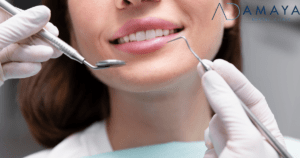A vibrant and confident smile is essential for our overall health and happiness. However, issues like tooth decay, gum disease, accidents, or genetic conditions can create serious challenges for our oral health. Full mouth rehabilitation offers a complete treatment plan to address these issues, restoring function, improving appearance, and ultimately enhancing our quality of life. In this article, we’ll delve into the details of full mouth rehabilitation, from its benefits to the procedures involved, and how it can truly transform the lives of those facing extensive dental issues.
Definition and Scope
Full mouth rehabilitation, also known as full mouth reconstruction or restoration, is a personalized approach aimed at restoring the functionality, appearance, and overall health of the entire mouth. It’s not just about fixing one tooth; it’s about addressing multiple dental concerns that affect the teeth, gums, jawbone, and bite. This comprehensive treatment goes beyond cosmetic improvements, focusing primarily on resolving functional issues, easing discomfort, and improving oral health.
Common Indications for Full Mouth Rehabilitation
Full mouth rehabilitation is typically recommended for individuals facing significant dental challenges that can’t be effectively treated with isolated procedures. Here are some common reasons why someone might need it:
Severe Dental Decay: When multiple teeth are extensively decayed, it may require several restorations or even extractions to restore oral health.
Missing Teeth: Having several missing teeth often requires a combination of dental implants, bridges, or dentures to restore functionality and appearance.
Tooth Wear and Erosion: Excessive wear and tear on teeth, whether from grinding, acid erosion, or other factors, may necessitate restorative procedures to prevent further damage.
Traumatic Dental Injuries: Accidents or injuries can lead to fractures, chips, or displacement of teeth, which may require full mouth rehabilitation to repair.
Temporomandibular Joint (TMJ) Disorders: Full mouth rehabilitation can help alleviate symptoms like jaw pain, headaches, and limited jaw movement associated with TMJ disorders.
Periodontal Disease: Severe gum disease can cause gum recession, bone loss, and tooth mobility, making full mouth rehabilitation necessary to restore oral health.
Goals of the Initial Consultation and Treatment
To kickstart the journey towards complete mouth restoration, the first step is an initial consultation with a dental expert. During this meeting, the patient and the dental team engage in open discussions about concerns, goals, and expectations. The dentist conducts a thorough examination, delves into the patient’s medical and dental background, and carefully reviews existing diagnostic records. This helps in gaining insight into the patient’s oral health status and establishing tailored treatment objectives.
The goals of full-mouth rehabilitation are personalized to meet individual needs and may include
Restoring Proper Oral Function: This involves addressing functional issues such as difficulty chewing, speaking, or biting caused by dental problems.
Enhancing Aesthetics: We aim to improve the appearance of your smile by addressing concerns like tooth discoloration, misalignment, or asymmetry.
Alleviating Pain and Discomfort: Our goal is to relieve any oral pain or discomfort you may be experiencing.
Achieving Long-Term Oral Health: We focus on improving your overall oral health, ensuring the longevity of restorations, and preventing future dental problems.
Digital Technology in Treatment Planning
Digital technology has revolutionized the treatment planning process for full-mouth rehabilitation, offering numerous benefits:
Digital Imaging: Cone beam computed tomography (CBCT) scans provide detailed 3D images, aiding in precise diagnosis, treatment planning, and dental implant placement.
Digital Impressions: Intraoral scanners capture accurate digital impressions, improving restoration accuracy and patient comfort. The iScanPro by Amaya Dental ensures precise details and delivers exceptional results.
Computer-Aided Design/Computer-Aided Manufacturing (CAD/CAM): This technology enables precise design and fabrication of dental restorations, resulting in quicker turnaround times and superior aesthetics. Amaya Zirconia Dental Crowns, milled with CAD/CAM technology, offer an excellent fit, streamlined digital workflow, and exceptional durability.
Virtual Treatment Simulations: Advanced software allows for virtual treatment simulations, enabling patients to visualize potential outcomes before undergoing procedures.
Ending Up
At Amaya Dental Clinic, known as the best dental clinic in Bangalore, we believe in harnessing the power of digital technology to elevate the accuracy, efficiency, and satisfaction of full-mouth rehabilitation. By incorporating digital tools, we not only enhance treatment outcomes but also foster better communication between our dental team and patients.
Full mouth rehabilitation serves as a beacon of hope for individuals grappling with significant dental challenges. It transcends mere aesthetics, aiming to restore function, alleviate discomfort, and improve overall health. Through collaborative efforts and the integration of advanced digital technology, we ensure that each patient receives personalized and effective treatment.
Our comprehensive approach tackles severe decay, missing teeth, and periodontal disease, offering a fresh start for oral health and self-assurance. With a team of interdisciplinary specialists and cutting-edge technology at our disposal, we meticulously plan and execute treatments, resulting in improved outcomes and enhanced communication with our patients.



